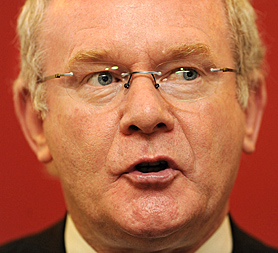McGuinness launches bid for Irish presidency
The IRA’s former chief of staff Martin McGuinness says he would be willing to meet the Queen if he succeeds in his bid to become president of Ireland.
Despite refusing to swear the oath of allegiance to the crown, Mr McGuinness said he would be happy to meet heads of state from all over the world.
His audacious bid for the Irish presidency would complete his personal journey from terrorist to member of the establishment.
He formally announces his candidacy on Sunday, after a top-level trade mission in the United States which included talks with Hollywood movie moguls.
But even they would baulk at the storyline the one-time IRA commander now hopes to write for himself by his bid to be elected President of Ireland.
The shock move, however, is just the latest twist in the life of a man who was branded the Provisional IRA’s mastermind, but who became a champion of the peace process, and defied all the odds by forming a government – and even a friendship – with his most bitter enemy, Ian Paisley.
The republican leader emerged from the riot-torn streets of Derry 40 years ago as a fresh-faced 21-year-old – the IRA’s boy soldier who ran the city’s Bogside, one of the cauldrons of conflict from which the Troubles erupted.
He was a feared street fighter who for years lived on the run, mostly across the border in Co Donegal. Security chiefs at the time considered him a ruthless terrorist who was at the centre of the IRA’s campaign.
But all that changed once the Provisionals called a halt to the bombing and shooting, first in 1994 and then three years later when the leadership announced a permanent ceasefire.
Martin McGuinness had been seen as the face of the IRA and the wider republican movement, alongside his partner in Sinn Fein, Gerry Adams.
But as politics replaced conflict, a new McGuinness began to emerge. Former enemies recounted tales of meeting a figure they found to be affable, who loved sport, enjoyed fly-fishing and even wrote poetry.

But he was nevertheless seen as Sinn Fein’s toughest negotiator and took the lead role in talks.
Over the last 20 years of Ireland’s slowly developing peace process, the 61-year-old has rubbed shoulders with successive US presidents and British prime ministers. But at home, he retains the ability to inspire both loyalty and enmity.
Last week, Sinn Fein held its annual conference in Belfast for the first time.
One of the highlights of the Ard Fheis was a speech by Presbyterian Minister David Latimer, the first Northern Ireland Protestant clergyman to address the republican gathering.
He has struck up a personal friendship with Mr McGuinness and embraced the senior republican at the event, before hailing him as one of the “true great leaders of modern times”. The fulsome praise brought bitter criticism from a number of unionist politicians.
On news of Mr McGuinness’s plan to run for the presidency, the clergyman said: “My first reaction is that this is a loss for Northern Ireland, because he has been involved in the process of turning our community 180 degrees and starting that new journey, if you like, that has taken us towards peace and a better future.
“I have watched Martin McGuinness change, so impressively change, that it would persuade me that he has a life beyond what he is currently engaged in, because he has, I think, changed in ways that prepare him for leadership at the highest level.”
Mr Latimer added: “In running for the President of Ireland, he would have my full support.
“At a difficult time economically, as well as socially and culturally, I would see him as a man who could send out ripples of hope.”